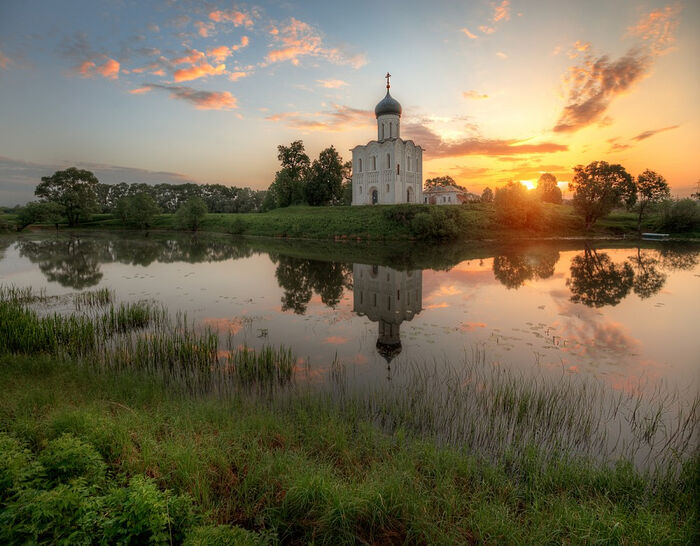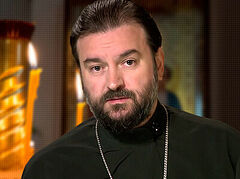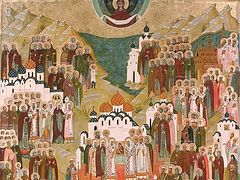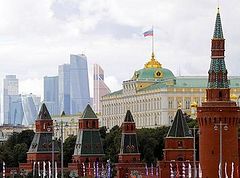The “Time of Troubles” refers to the period in medieval Russian history when the Poles were intriguing to take over Moscow and force Russia into Roman Catholicism.1
 Church of the Protection on the Nerli River. Photo: Eduard Gordeyev/egord.photosight.ru
Church of the Protection on the Nerli River. Photo: Eduard Gordeyev/egord.photosight.ru
On March 13, 2022, on the first Sunday of Great Lent, scholars, clergy, and laity of the Orthodox Christian Studies Center of Fordham University (a private Jesuit University in New York) and the Volos Academy of Theological Research (Greece) published a Declaration on the teaching of “Russian world”.2
The declaration begins as a geopolitical text with terminology appropriate to that discipline,3 expressing its oppositional stance toward the political and ecclesiastical leaders of Russia, but then leads into conclusions of a theological nature. The protest of those Orthodox clergy and laity who signed this document are thus, in fact, at once political (in this case the overwhelming majority’s position concurs with the official position of the governments of nations where they hold citizenship and reside) and ecclesiastical. Let us note straight off the extraordinary media success of this composition, which is atypical for a theological text on such a narrow specialization as Orthodox theology. The Declaration was immediately cited in publications on all continents and in various languages, including European languages, with added interpretations by journalists of all different specializations.4
From its ecclesiastical position, the Declaration criticizes the teaching of “Russian world” as a form of “ethnophyletistic religious fundamentalism”, or the “heresy of ethnophyletism”, which, as the authors of the text suppose, determines the actions of the Russian authorities in the Russian Church.
We understand that only extreme concern for the humanitarian situation in Ukraine could arouse Orthodox clergy and laity to establish their position in such a sharp, admonishing form. Nevertheless, it is difficult for a Russian Orthodox reader responding to the Declaration to understand the author’s concept of “Russian world” as a heresy. This is primarily because there are absolutely no citations in the text of sources that would expose this “false teaching”, if you don’t count the reminder that “the statements of President Vladimir Putin and Patriarch Kirill (Gundyaev) have many times over the past twenty years called for and developed the ideology of “Russian world”. But after all, ordinarily the hermeneutics of one or another teaching come about in accordance with a Church’s doctrinal and canonical documents, minutes of councils, books, conferences, and finally, scholarly courses and textbooks—if we are talking about an official public religious organization, and not a secret society or concordat. Inasmuch as the Declaration was signed by certain well-known scholars, who could in no way be suspected of negligence or conspiratorial methods, then this, with all due respect, speaks to one thing: The text of the Declaration is not based on sources for the simple reason that it presupposes broad analytical work carried out earlier on a reconstruction of a doctrine of “Russian world” in some other texts. In other words, the Declaration exposes a teaching that was previously devised and accepted by the authors as fact.
Thus, the Declaration’s theological formulation is nothing more than the tip of a grandiose iceberg, the “underwater portion” of which can be found in the numerous articles that have come out over recent years on the theme of “Russian world” and the Russian Church as a “soft geopolitical power”. That many publications have appeared, written by political scientists, historians, sociologists, lawyers, religion scholars, and economists outside of Russia about the Russian Orthodox Church, should, it would seem, delight us—especially after so many long decades when in the West, few were interested in the Orthodox Church; and in the USSR, the Church was only written about within the genre of atheistic propaganda. But alas, the aim of these publications is something quite different from what we would hope—something about which we can now guess after reading the Declaration on the Russian world.5 In this mass of literature we do encounter articles by theologians, but it is interesting that their opinions are voiced specifically within the context of foreign policy consulting projects.6
Thus, the authors of the Declaration obviously draw their conclusions from the fact that this extensive work carried out by a scholarly community outside of Russia has been generally accepted as socio-humanitarian knowledge. This is what the Declaration’s argumentation proceeds from. We can suppose that the argumentation had been previously presented, and now it only remains to give the final definition—to “shake off the dust” of the heretical “Russian world” from the Orthodox worldview.
The text of the Declaration causes us profound perplexity and seems very far from real life
This avalanche of publications and authors, who are playing the role of a society of experts on the Russian Church beyond Russia’s borders, is, amazingly, totally unknown to the majority of Russian Orthodox people. Therefore, the text of the Declaration causes us truly profound perplexity and seems very far from real life. Its main culprit is the ideology of “Russianness”. However, today’s Orthodox population in general has little interest in any ideology after the soviet period; their temptations much more often consist in consumerism rather then ideology. It is an irrefutable fact that members of the Russian Orthodox Church today can have extremely different views and convictions, belong to various sociological groups and parties, are of different nationalities, and can be citizens of different countries. The church remains a place that is open to all, and that is what gives it grounds for calling its members “brothers and sisters”. Attempts by upper governmental officials in Russia to write and discuss conceptual texts on the values of Russian civilization evoke neither massive nor minimal collective enthusiasm and remain no more than the personal or departmental initiative of government workers and their experts oriented in that direction. The lack of any strict conceptualization can also be seen in the fact that even for the supporters of “Russian world”, the word “world” in this expression could easily be equated with “idea”, “culture”, “cultural-lingual commonality”, “civilization”, “historical commonality”, “historical project”, “roots”, “compatriots”, “order”, and so on. But the word “Russian” does not have any strict ethnic meaning. To the contrary, in geopolitical criticism of the concept of “Russian world”, the key concept is precisely that of “world” (мир-mir), because it is conflated with the thesis of the “Russian world’s” territorial definition and its implicit aggressive, all-devouring expansion. Meanwhile, the other meanings of the Russian word “мир”, which even Russian schoolchildren who have studied Leo Tolstoy’s War and Peace [the word for “peace” in Russian is also “mir”.—Trans.] can grasp, is completely lost on the critics of “Russian world”,7 and are only partially conveyed in any analogies you look for in Romano-Germanic culture (Pax Rossica).
All of this could have been discussed with our colleagues abroad in another time, in the context of peaceful theological dialogue; but at the present moment this seems completely inappropriate. In the heat of an acute military conflict and the frightening vulnerability of a large number of people, it is preferable not to talk about it or discuss it, but to do what our Christian conscience dictates and circumstances allow. Just the same, it is sad that in the moment of an unprecedented crisis, when from all Christians is required efforts toward humaneness and remembrance of God, an accusation of heresy against an entire Local Church gets published, based on the writings of unscrupulous analysts who are very far from the experience and practice of Church life. It seems to us that the people upon whom the noble task is placed to be teachers of others could have acted differently even in the context of a brotherly rebuke, and allow that they could be mistaken due to their basic misunderstanding of the inner life of another Church. Then understanding could be hoped for in the future. This hope of ours is strengthened by the unique ecclesiastical experience of the twentieth century, when religious leaders, divided by the fronts of the First and Second World Wars, later met at conferences and meetings with the sincere desire to overcome all forms of human enmity for the sake of Church and society.8
As for the accusation of ethnophyletism: It must be said that the Declaration contains no citations from texts of the Russian Church, nor to relevant statutes of Orthodox teaching, without which any discussion of heresy is devoid of any theological content. Because of this it is not understood in what sense the authors of the Declaration use the word, “heresy”—in the theological sense, or in the publicist’s or mundane sense (as for example in science or political parties there are sometimes references to “heretics”). The reference to the Constantinople Council of 1872 does not explain this problem, because they are talking about the Constantinople Patriarchate, which had to do with ecclesiastical rule within the Ottoman Empire and never had, nor could have had a general ecclesiastical reception. Its resolutions have no canonical force with regard to the Russian Orthodox Church, which furthermore never recognized the “Bulgarian schism” as a heresy, but to the contrary, found the Orthodox Bulgarians’ demands concerning the language of church services and their fellow Bulgarian clergy quite justified. In Russia the “Greco-Bulgarian schism” was viewed as a schism—doubly sad because it was brought about with the support of non-Christian Turkish authorities from both sides. But in any case, with the nullification of the schism by the Constantinople Patriarchate in 1945, the “Bulgarian question” was finally resolved without any mention in those documents of the renunciation or overcoming of a “heresy”.
In order to explain the resolutions of the Constantinople Council of 1872, it must be said that the ideology of nationalism really was a huge problem, recognized in the nineteenth century in the era of revolution. Moreover, the problem was not only in its national content, but in the very radical and total “ideologification” of human life. People were possessed by ideologies; ideologies seemed to be absolute knowledge, enabled the fragmentation of people’s perception of reality, and justified the extermination of people who did not share those ideas. The Catholic Church responded to the challenge of national-progressive revolutionary ideas with its First Vatican Council of 1870, at which the “papal dogma” was ratified. Supra-national loyalty to the Pope became for Catholics a kind of lighthouse in a world of clashing military ideologies. The Constantinople Council of 1872 belonged to the same era, and was faced with similar challenges of ideological nationalism that were even more dangerous to the security of the mixed population on the territory of the Ottoman Empire. The Council strengthened the authority of the Constantinople Patriarch and the cultural (Greek) uniformity in that complicated moment. If the Vatican Council introduced a new dogma, then the Constantinople Council introduced a newly-condemned heresy, called upon to slow the centrifugal processes going on within the empire.9
We are dealing not with historical science in the service of theology, but with political mythology
When the Balkan situation is insistently projected onto the peaceful, multinational situation existing amongst the peoples of Russia, which even during moments of deep schisms on political grounds (for example, the “Reds” and the “Whites”) did not acquire the nature of an ethnic conflict, we are dealing not with historical science in the service of theology but with political mythology. This is an unsuccessful, unfounded, and unconscionable analogy that doesn’t withstand criticism. The “Balkan projection” is the source of misunderstanding concerning the multinational Russian Church, as well as the Ukrainian Orthodox Church. In the future, when a meaningful inter-Orthodox dialogue can be continued, these questions could become an important subject for study.
As for the accusations of “demonization of political and religious dissenters and minorities” (the infamous Gay parades, performances in churches, etc.): Because in Russia, Church and State have been separate for over a century, the Church reserves the freedom of faith-teaching and cultural expression as Christian witness. This is simply witness, in no way nationalistic (“phyletistic”), but universal, based on Holy Scripture and centuries-long experience of church life. The Russian Church has no grounds for changing its proclamations and mission; moreover, it has no right to change them willfully, to be in step with the reigning worldview and political convictions of the “progressive world”. We can recall in connection with this the words of the cultural historian S.S. Averintsev:
“We live in such times when, to put it simply, all words have already been said. Everyone who speaks is obligated to know that he is expressing a point of view, which, in general, is already known to the listeners, along with all the arguments against it. It is useless to pretend that this isn’t so. We must realistically understand the responsibility that each has. For the same reasons that a person who sees that everyone has huddled on one side of a boat and the boat is about to capsize is obligated to run to the opposite side of the boat, we are obligated to relate more thoughtfully and carefully to the old values at the very moment when we see them threatened with extinction… And here we are talking about … how a peaceful and particularly decisive loyalty should be preserved toward our personal stance, so that the meeting of stances would not turn into an indifferent amalgamation. This is hard, but anything else is perdition—if not physical then spiritual…”10
This cultural and missionary choice of the Russian Church, which contradicts what could be called the mainstream global world, can be the subject of discussion and public criticism—why not? Only it should be conscientious criticism, bona fides. But the Declaration does not in this sense presuppose any aim whatsoever of creating at the very least some semblance of validity. Its description of “Russian world” leaves one with a strange impression of a façade without a building behind it, like a prop in a film studio erected for only one purpose: to effectively burn it down in the final scene.
We can suppose one more explanation for this: The text is in no way shape or form a brotherly reproach directed at the leadership and members of the Russian Orthodox Church. Possibly it is addressed to Orthodox Christians who don’t live in Russia or the countries adjoining it—in the Near East, Asia, and even Africa; and they are the ones who are being urged to renounce the “machinations of the Russian world”. With these readers it may not be necessary to talk about the nuances of Russian history—it’s enough to delineate a clear opposition, albeit by informationally unscrupulous means. The main thing is that they be faced with a choice.
It seems that there is no way out of the current dead end in Orthodox dialogue to one or another political center of influence. The only way out for the Christian conscience is to choose the Church that illumines the world with the Word and the Sacraments and therefore has no right to depart from the framework of its own calling and take on the responsibilities and aims of the state, thus turning the Church’s message into a political tribunal. We believe that the current misunderstanding will be overcome in the future, when inter-Orthodox cooperation will be dedicated to the common Christian mission in the world, where there is a thirst for the Word and for peace.




